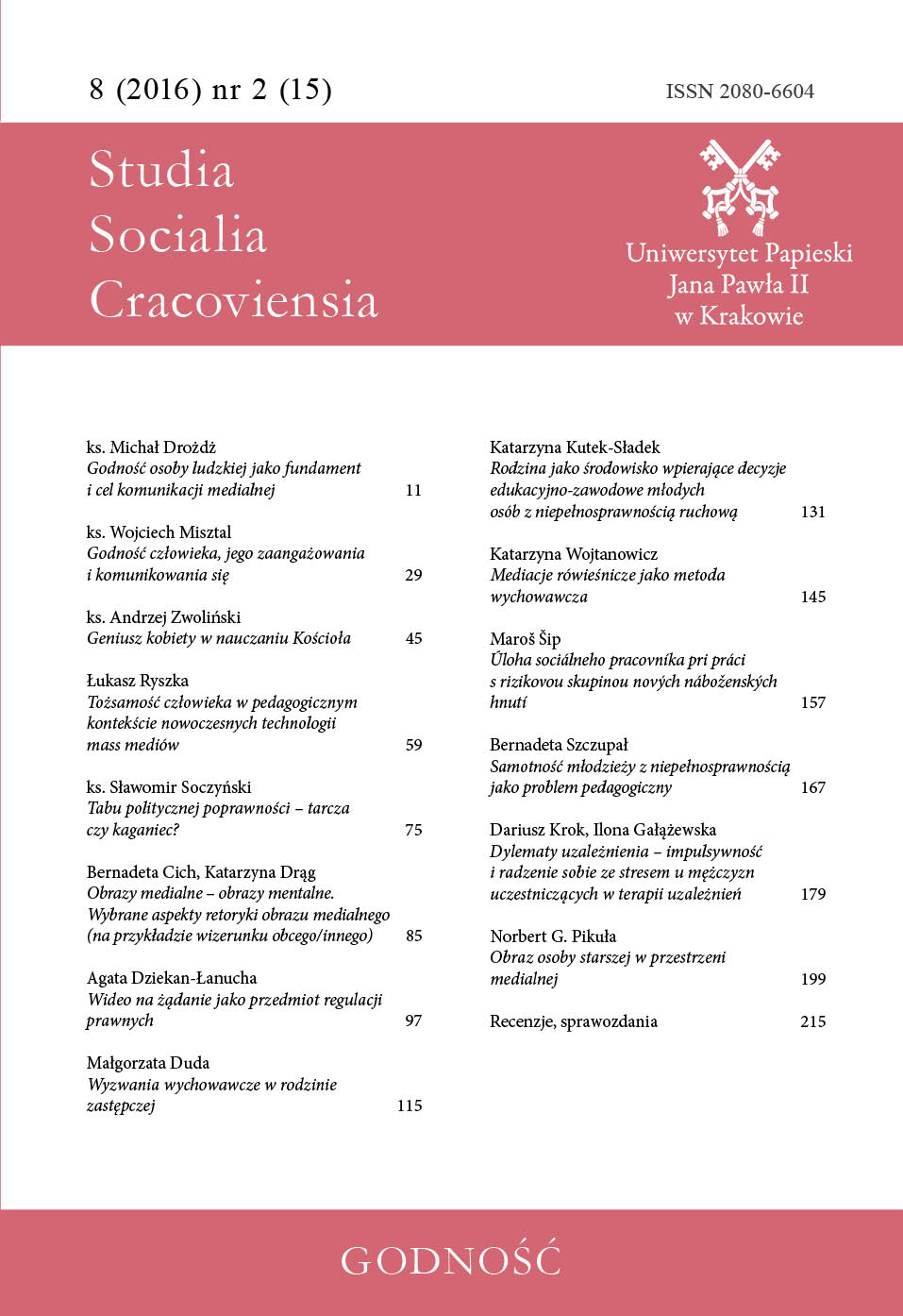Rodzina jako środowisko wpierające decyzje edukacyjno‑zawodowe młodych osób z niepełnosprawnością ruchową
DOI:
https://doi.org/10.15633/ssc.2004Słowa kluczowe:
niepełnosprawność, rodzina, wybór zawoduAbstrakt
W niniejszym artykule omówiono rolę rodziny w procesie wsparcia związanego z wyborem kierunku kształcenia i zawodu przez młode osoby z niepełnosprawnością ruchową. Dla tej grupy, jako przyszłych pracowników – dobrze wykształconych młodych osób z niepełnosprawnościami – wejście na rynek pracy jest czasami trudne i bardzo często kończy się niepowodzeniem, stąd rola rodziny jako środowiska wspierającego wydaje się znacząca. Szczególną uwagę zwrócono na omówienie czynników wpływających na wybory edukacyjno‑zawodowe, takich jak: poziom wykształcenia rodziców, wybór kierunku studiów a zawody wykonywane przez członków rodziny, sytuacja socjalno‑bytowa rodziny, zadowolenie rodziców z wyborów zawodowych badanych i inne. Ponadto dokonano przeglądu możliwości rozwoju karier zawodowych osób z niepełnosprawnościami w oparciu o funkcjonujący system wsparcia.Bibliografia
Auleytner J., Głąbicka K., Polskie kwestie socjalne na przełomie wieków, Warszawa 2001.
Bańka D., Psychologiczne uwarunkowania perspektyw zawodowych młodzieży. Studium roli rodziny, Katowice 1983.
Byra S., Percepcja wsparcia i osoby wspierającej studentów niepełnosprawnych, w: Student niepełnosprawny – wybrane konteksty, red. S. Byra, M. Parchomiuk, Lublin 2010, s. 31–48.
Cierpiałowska T., Studenci z niepełnosprawnością, problemy funkcjonowania edukacyjnego i psychospołecznego, Kraków 2009.
Danieluk B., Wizja świata społecznego a aktywność polityczna młodzieży: raport z badań, Warszawa 2006.
Giermanowska E., Racław M., Niepełnosprawni absolwenci szkół wyższych – nowy potencjał zawodowy czy narastający problem społeczny?, „Acta Universitatis Lodziensis, Folia Sociologica” 50 (2014), s. 7–26.
Janowski A., Aspiracje młodzieży szkół średnich, Warszawa 1977.
Kukla D., Duda W., Czerw‑Bajer M., Osoby niepełnosprawne w systemie edukacji i poradnictwa zawodowego, Warszawa 2011.
Kukla D., Wybory zawodowe uczniów, „Edukacja i Dialog” listopad/grudzień 2009, s. 54–58, www.eid.edu.pl (23.10.2015).
Matyjas B., Opieka i wychowanie w rodzinie bezrobotnej: zakres i formy pomocy, w: Opieka i wychowanie w rodzinie, pod red. C. Kępskiego, Lublin 2003, s. 48–53.
Ochonoczenko H., Potrzeby osób niepełnosprawnych w zakresie aktywizacji zawodowej, Warszawa 2007.
Okoń W., Słownik pedagogiczny, Warszawa 1981.
Pentor Research International S. A., Badania wpływu kierunku i poziomu wykształcenia na aktywność zawodową osób niepełnosprawnych. Raport końcowy, Warszawa 2009.
Sowa J., Młodzież niepełnosprawna a wybór zawodu i jego determinanty, Rzeszów 1987.
Suszek K., Rodzina a rozwój dzieci i młodzieży, Szczecin 1995.
Winiarski M., Rodzina – szkoła – środowisko lokalne. Problemy edukacji środowiskowej, Warszawa 2000.
Wieczorek G., Rola rodziców w procesie przygotowania dziecka do wyboru zawodu, w: Rodzina w lokalnym systemie pomocy społecznej, red. S. Czarnecka, R. Majer, M. Mirowska, Częstochowa 2005.
Pobrania
Opublikowane
Numer
Dział
Licencja
Autorzy publikujący w czasopiśmie udzielają jego wydawcy zgody o następującej treści:
- Autor zachowuje autorskie prawa majątkowe do utworu, a jednocześnie udziela wydawcy czasopisma zgody na jego pierwszą publikację w wersji drukowanej i wersji online na licencji Creative Commons Uznanie autorstwa 4.0 Międzynarodowe oraz zgody na wykonywanie opracowań, w tym przekładów.
- Autor ma możliwość udzielania zgody niewyłącznej na opublikowanie utworu w wersji, która ukazała się w czasopiśmie (np. zamieszczenia go w repozytorium instytucjonalnym lub opublikowania w książce), wraz z informacją o jego pierwszej publikacji w czasopiśmie.
- Autor może umieścić swój utwór online (np. w repozytorium instytucjonalnym lub na swojej stronie internetowej) jeszcze przed zgłoszeniem utworu do czasopisma.

